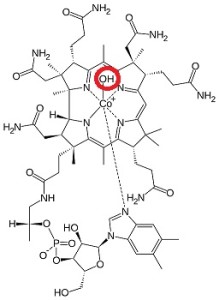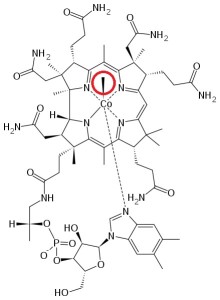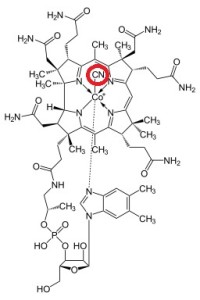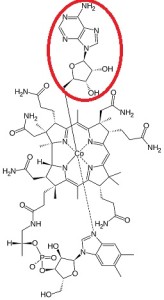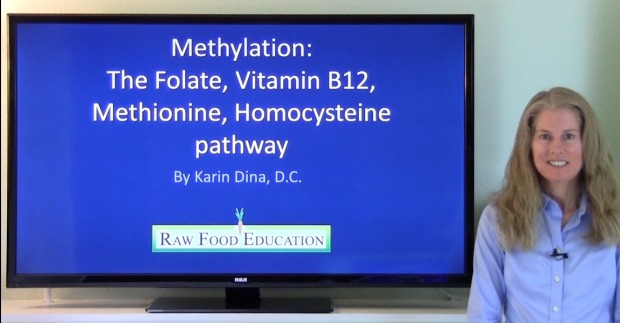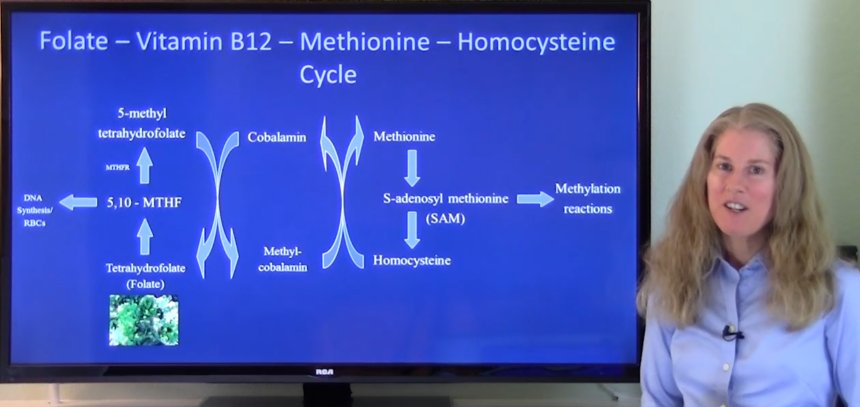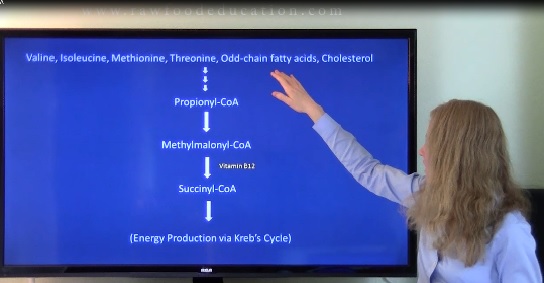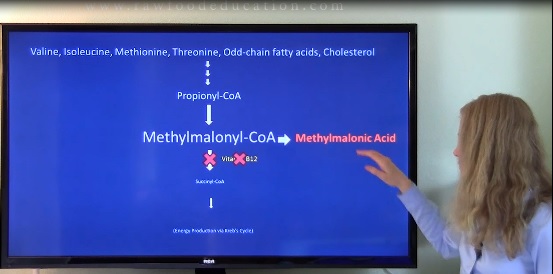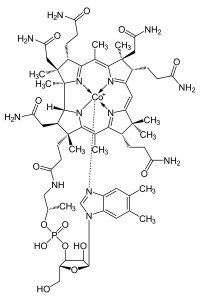 Over the years, people have asked me about the differences between the available supplemental forms of vitamin B12. What are they? Do they occur in nature or are they made in a laboratory? Do some forms work “better” than others?
Over the years, people have asked me about the differences between the available supplemental forms of vitamin B12. What are they? Do they occur in nature or are they made in a laboratory? Do some forms work “better” than others?
The scientific name for vitamin B12, cobalamin, is derived from the element cobalt found at the center of the vitamin B12 molecule. There are several different forms of vitamin B12, each named for the chemical group attached to cobalt, including hydroxocobalamin, methylcobalamin, cyanocobalamin, and adenosylcobalamin. I have seen these forms of B12 available as individual supplements or in multivitamin formulas.
Hydroxocobalamin
Hydroxocobalamin is a naturally-occurring form of vitamin B12, as it is made by certain bacteria including some strains that live in soil. Not all types of bacteria make vitamin B12 and not all soil contains B12 producing bacteria. Yeast, mushrooms and other types of fungus do not produce vitamin B12, neither do animals nor plants.
Hydroxocobalamin is NOT active in the human body; it requires conversion to a human bioactive form. Hydroxocobalamin has an –OH (hydroxy) group attached to cobalt in the center of the vitamin B12 molecule. To activate this form of B12, the human body removes the –OH group and replaces it with, for example, a methyl (–CH3) group to create the human bioactive form of vitamin B12, methylcobalamin.
Methylcobalamin
Methylcobalamin is a form of vitamin B12 that is involved in methylation reactions in the human body. Another of my videos covers the importance of methylation and the role played by this form of vitamin B12, so I would encourage you to view it for further explanation. Dr. Rick and I have used methylcobalamin for many years and find it to be a reliable form of B12 for our needs. We especially like this form of vitamin B12 because it is a human bioactive form and does not require conversion.
Cyanocobalamin
Cyanocobalamin is a synthetic form of B12 made exclusively in a laboratory. It is not a human bioactive form of vitamin B12 and is not made by bacteria in nature. Cyanocobalamin has a –CN (cyano) group attached to cobalt in the center of the vitamin B12 molecule. Many people have expressed concern about this cyano group as being problematic or toxic, but I have yet to see research or clinical data indicating the use of cyanocobalamin as being associated with these types of issues. When one expresses concern to me, I suggest the use of another supplemental form. As mentioned earlier, I have been using methylcobalamin for many years with good results. If someone is not getting the results they want from their vitamin B12 supplement, clinically or otherwise, I suggest that they contact a qualified healthcare provider to help them find the solution that works best for them.
Despite this controversy, cyanocobalamin is one of the most popular supplemental forms of vitamin B12 because of its stability and shelf-life. For example, cyanocobalamin has a longer shelf-life than methylcobalamin, so supplement manufacturers like to produce and sell it. Since cyanocobalamin is not human bioactive, our body must convert it to one of the human bioactive forms. In which case, the body must remove the –CN group and replace it with either a methyl group or an adenosyl group.
Adenosylcobalamin
Like methylcobalamin, adenosylcobalamin is one of the human bioactive forms of vitamin B12. This is the form of vitamin B12 that can be stored by our body, specifically in our liver. All previously discussed forms of B12 can be converted into adenosylcabalamin for storage, when our body has more vitamin B12 than is needed for body function.
Adenosylcobalamin is also very important for energy-producing reactions in the human body, as are various other B vitamins. Additionally, adenosylcobalamin is responsible for keeping methylmalonic acid levels appropriately low in the human body. I have a recent video and article describing the significance of methylmalonic acid and its conversion by adenosylcobalamin in the human body, and would encourage you to view it for more information.
Interested in taking your vitamin B12 and nutrition knowledge to the next level? We cover this topic and so much more in our online Mastering Raw Food Nutrition and Educator Course. For more class details, click here.
Additionally, our book The Raw Food Nutrition Handbook: An Essential Guide to Understanding Raw Food Diets addresses many hot topics in raw food nutrition such as vitamin D, essential fats, protein, nutrient content of raw food diets, food combining, enzymes, hydration, vitamins, minerals, and many more. We value education on these important topics and are happy to finally bring this book to you. The book is available on Amazon and other online booksellers.
One of the best ways to keep in touch with us is to join our email list. You’ll receive a free copy of Our Top 12 Strategies for Long Term Success on A Raw Plant-Based Diet eBook along with regular information about raw food and plant-based diets and periodic promotions for our classes, events, and other offerings!
Why is vitamin B12 so important for our health? How is vitamin B12 used in the human body?
Many people over the years have asked me about why vitamin B12 is so important for our health and what vitamin B12 actually does in the human body. Vitamin B12 is involved in numerous methylation reactions throughout the body and in a vitamin B12 deficiency, these reactions can become compromised.
Vitamin B12 is involved in the production of our genetic code (DNA and RNA), activation of folate, production of red blood cells, keeping homocysteine appropriately low in our body, the production of certain cell membrane components, the production of certain neurotransmitters (including serotonin, melatonin, epinephrine, and dopamine), important reactions involving energy production, and nervous system function. The bottom line is that vitamin B12 is vitally important for a number of life-sustaining activities in our body and should not be overlooked when considering one’s overall health.
Check out this video for more details:
The information in this video builds on a video I did several months ago on the vitamin B12 – folate connection. If you're interested in taking your knowledge to the next level.........
We cover this topic and so much more in our online Mastering Raw Food Nutrition and Educator Course. For more class details, click here.
Additionally, our book The Raw Food Nutrition Handbook: An Essential Guide to Understanding Raw Food Diets addresses many hot topics in raw food nutrition such as essential fats, protein, nutrient content of raw food diets, food combining, enzymes, hydration, vitamins, minerals, and many more. We value education on these important topics and are happy to finally bring this book to you. The book is available on Amazon and other online booksellers.
One of the best ways to keep in touch with us is to join our email list. You’ll receive a free copy of Our Top 12 Strategies for Long Term Success on A Raw Plant-Based Diet eBook along with regular information about raw food and plant-based diets and periodic promotions for our classes, events, and other offerings!
How can folate mask a vitamin B12 deficiency?
This pathway is a little biochemically-intense, so I encourage you to watch the video first and then read the text below for clarification.
Vitamin B12 converts homocysteine to methionine by transferring methyl groups from 5-methyl tetrahydrofolate to homocysteine.
In a vitamin B12 deficiency, we often see elevated homocysteine levels, because vitamin B12 is not available to transform homocysteine into methionine. So, homocysteine levels increase.
In a vitamin B12 deficiency we can also see large red blood cells, referred to as macrocytic anemia, because vitamin B12 is not available to convert 5-methyl tetrahydrofolate back into folate. This is called the "methyl folate trap", where folate is "trapped" in the form of 5-methyl tetrahydrofolate. Folate is used to create red blood cells and DNA, and when there isn't enough folate available, red blood cells do not fully mature and stay large. On a lower folate diet, such as with many versions of the standard western diet, we tend to see this situation.
However, when someone with a vitamin B12 deficiency eats a higher folate diet, such as on a plant-based diet, there is a constant supply of folate to create red blood cells and DNA, so red blood cells may appear normal in size. This is how folate can mask a vitamin B12 deficiency. In other words, one needs look beyond the size of red blood cells when testing for vitamin B12 deficiency, and employ other reliable vitamin B12 tests. Accurate vitamin B12 testing by a knowledgeable, licensed clinician is essential for determining one's vitamin B12 status.
If you're interested in taking your knowledge to the next level.........
We cover this topic and so much more in our online Mastering Raw Food Nutrition and Educator Course. For more class details, click here.
One of the best ways to keep in touch with us is to join our email list. You’ll receive a free copy of Our Top 12 Strategies for Long Term Success on A Raw Plant-Based Diet eBook along with regular information about raw food and plant-based diets and periodic promotions for our classes, events, and other offerings!
What is methylmalonic acid and how does it relate to vitamin B12?
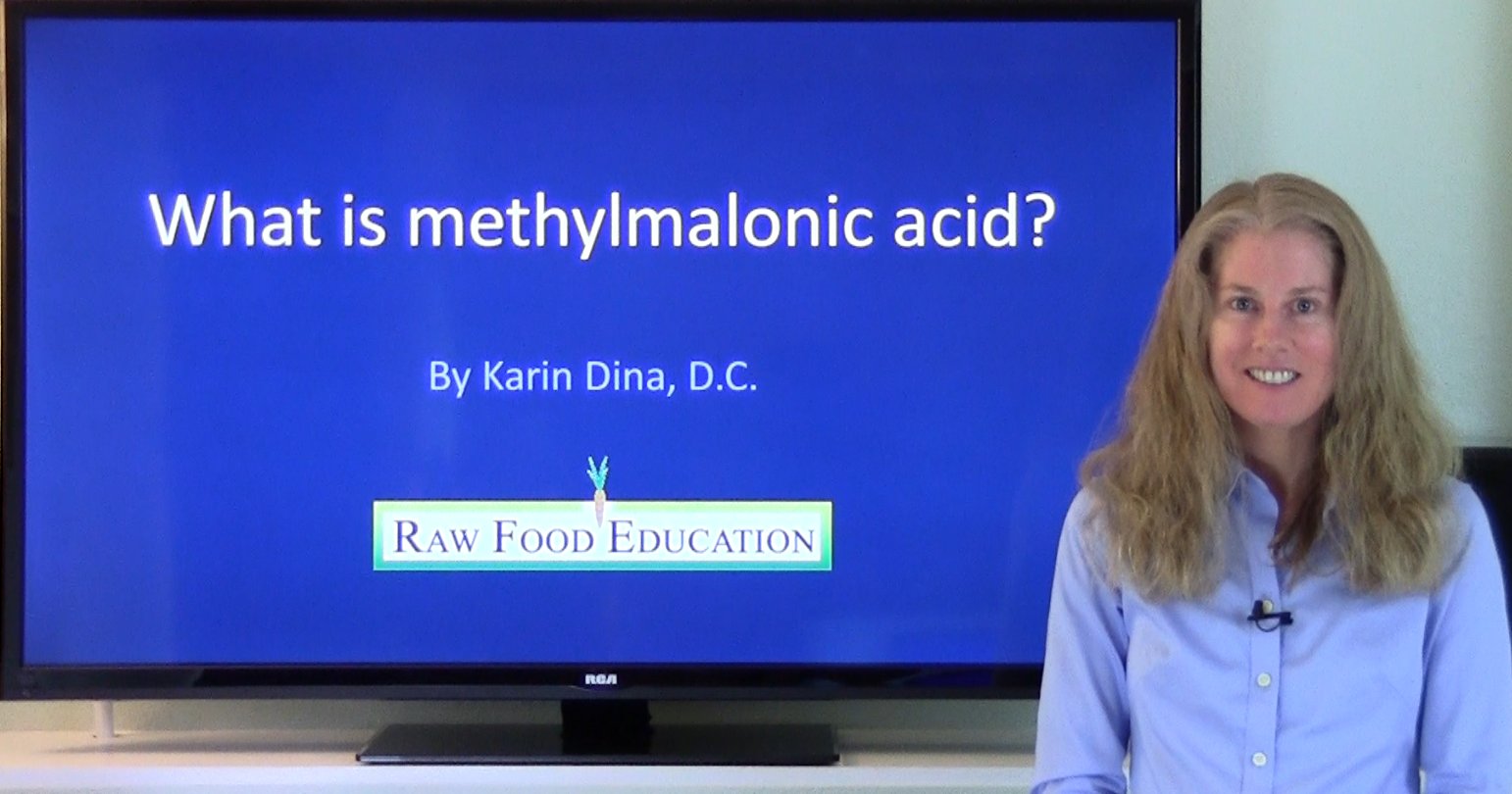 Methylmalonic acid (MMA) is a popular vitamin B12 test.
Methylmalonic acid (MMA) is a popular vitamin B12 test.
But what actually is MMA and where does it come from? In the human body, MMA is a breakdown product or byproduct of protein, carbohydrate, and cholesterol metabolism. In other words, when a variety of proteins, fatty acids, and cholesterol are used to create energy, one of the byproducts is methylmalonic acid.
The specifics of this energy producing pathway are described as follows: In the creation of energy, the amino acids valine, isoleucine, methionine, threonine, odd-chain fatty acids, and cholesterol all go through a variety of metabolic processes to be converted into a substance called propionyl CoA. Propionyl Co-A is then converted into methylmalonyl CoA. When we are in good human bioactive B12 status, methylmalonyl CoA is then converted into succinyl CoA by an enzymatic reaction in which vitamin B12 is a co-factor. In other words, vitamin B12 is essential for the conversion of methylmalonyl CoA into succinyl CoA.
Succinyl CoA is an intermediate in the Kreb’s Cycle (also known as the TCA cycle), which is involved in energy production. We now see how vitamin B12 plays a role in energy production in our body.
What happens when someone becomes B12 deficient? The pathway that converts methylmalonyl CoA into succinyl CoA becomes de-emphasized and the amount of methylmalonyl CoA starts to increase. As this amount increases, methylmalonyl CoA is converted into methylmalonic acid. Methylmalonic acid does not have any specific function in the body, so it is eliminated from the body by the urinary tract. When one is deficient in vitamin B12, their blood and urine generally have elevated levels of methylmalonic acid.
Vitamin B12 is very important for this pathway and many other reactions throughout the body. The bottom line is that it is a good idea to know our vitamin B12 status, which we can achieve through reliable B12 testing.
We cover the importance of vitamin B12, reliable testing, and reliable sources in our book, The Raw Food Nutrition Handbook, An Essential Guide to Understanding Raw Food Diets. If you are interested in our lab testing and nutrition consulting services, please visit www.rawfoodconsulting.com.
This video explains how and why methylmalonic acid can be created in the human body:
One of the best ways to keep in touch with us is to join our email list. You’ll receive a free copy of Our Top 12 Strategies for Long Term Success on A Raw Plant-Based Diet eBook along with regular information about raw food and plant-based diets and periodic promotions for our classes, events, and other offerings!
Video: What I Learned about Vitamin B12 from the Framingham Offspring Study
One of the best ways to keep in touch with us is to join our email list. You’ll receive a free copy of Our Top 12 Strategies for Long Term Success on A Raw Plant-Based Diet eBook along with regular information about raw food and plant-based diets and periodic promotions for our classes, events, and other offerings!
What I learned about vitamin B12 from the Framingham Offspring Study
![400px-Cobalamin.svg[1]](https://rawfoodeducation.com/wp-content/uploads/2013/07/400px-Cobalamin.svg1_.png) I first came across the Framingham Offspring Study several years ago when I was doing some research on the vitamin B12 status of people of various dietary persuasions. I found the results of this study to be fascinating, and apparently I am not the only one who feels this way, given that I have seen this study mentioned in numerous YouTube videos, in various health blogs, and in class by many of my students. Why is this study in particular so popular?
I first came across the Framingham Offspring Study several years ago when I was doing some research on the vitamin B12 status of people of various dietary persuasions. I found the results of this study to be fascinating, and apparently I am not the only one who feels this way, given that I have seen this study mentioned in numerous YouTube videos, in various health blogs, and in class by many of my students. Why is this study in particular so popular?
The answer likely involves many reasons. Here a couple of my thoughts:
- This study talks about the vitamin B12 status of the study participants. There is little doubt that vitamin B12 is a hot topic in the health community and most people I have spoken with over the years have expressed interest in learning about B12. In fact, it is one of the more popular questions that Rick and I are asked.
- The study participants were omnivores. People who eat a plant-based diet or vegan diet are told to be aware of their B12 status, but what about omnivores? Do they need to be aware of this too?
The Framingham Offspring Study (FOS) helps answer this question. The study examined the B12 status of 2,999 omnivores of ages ranging from 26 – 83, along with supplemental and food sources of B12, such as fortified cereal, dairy products, and various types of meat. Here is a brief summary of the data from this study:
- 39% of study participants were found to have blood levels of vitamin B12 in the “low normal” to deficient range (<258 pmol/L or 350 pg/ml) and the youngest members of the group (26 – 49 years) had similar B12 status to the 65 years and older group.
- Study participants who consumed supplements and/or cereal fortified with B12 had the highest blood levels of B12, followed by dairy products, and then meat.
- Study participants who got most or all of their B12 from meat sources, had the lowest blood B12 levels.
- The researchers commented that vitamin B12 supplements and fortified foods are likely to be more reliable sources of B12 than non-fortified foods, and that the use of supplements in particular was found to be protective against low vitamin B12 levels in this and previous studies.
- Because of these outcomes, the researchers suggest that the potential for B12 deficiency in the general adult population be examined.
I was not completely surprised to see that this study calls to question the reliability of meat as an adequate source of B12, as we have consulted with several people in the past few years that have been low in B12 despite eating an omnivorous diet. Hmmm…..
I would encourage you to read this study, and see for yourself what the data indicates. I have provided here a brief summary of what I learned from this study, but the actual full-text article gives much more specific information on the observations of the researchers.
Granted, this is only one study and some case histories, but nonetheless I personally feel that it is important for everyone to consider their B12 status regardless of whether or not they are a vegan, vegetarian, omnivore, etc. As this study indicates, there are many factors to consider in this B12 puzzle. Here is a link to the full text article of the Framingham Offspring Study.
Reference:
Tucker KL, Rich S, Rosenberg I, Jacques P, Dallal G, Wilson PW, Selhub J. Plasma vitamin B-12 concentrations relate to intake source in the Framingham Offspring study. Am J Clin Nutr. 2000 Feb;71(2):514-22.
Interested in taking your vitamin B12 and nutrition knowledge to the next level? We cover this topic and so much more in our online Mastering Raw Food Nutrition and Educator Course. For more class details, click here.
One of the best ways to keep in touch with us is to join our email list. You’ll receive a free copy of Our Top 12 Strategies for Long Term Success on A Raw Plant-Based Diet eBook along with regular information about raw food and plant-based diets and periodic promotions for our classes, events, and other offerings!

